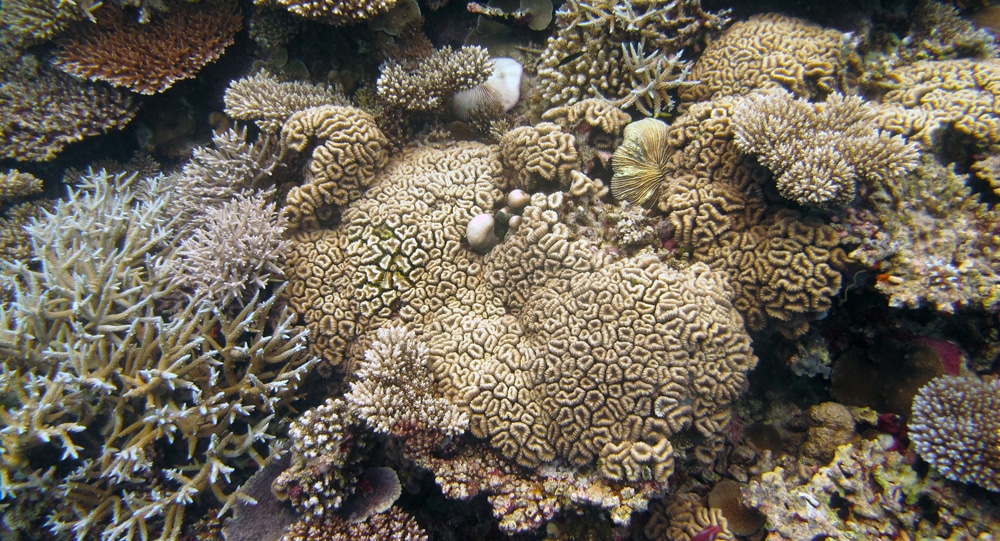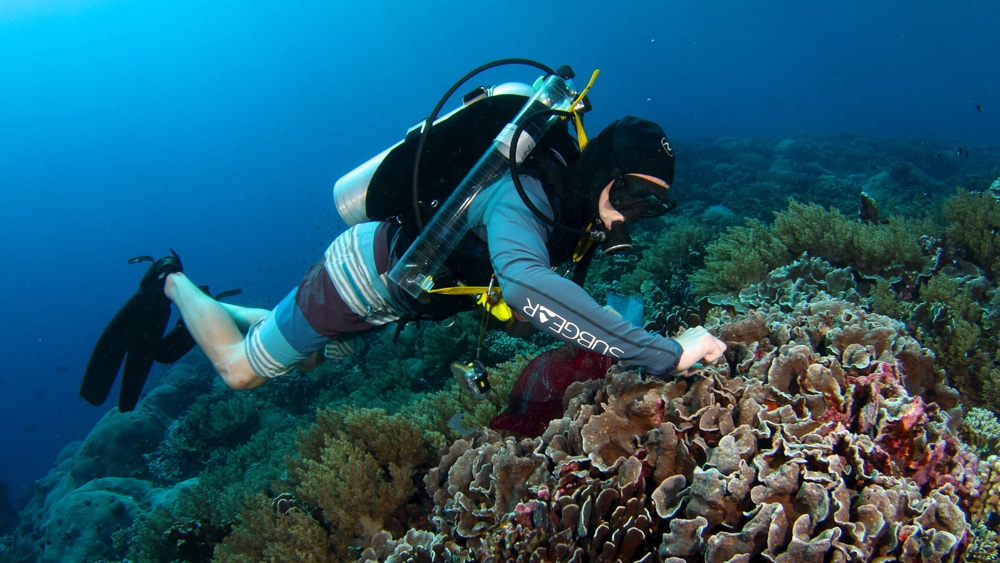Marine Life & Conservation
New study measures how much of corals’ nutrition comes from hunting

When it comes to feeding, corals have a few tricks up their sleeve. Most of their nutrients come from microscopic algae living inside of them, but if those algae aren’t creating enough sustenance, corals can use their tentacles to grab and eat tiny prey swimming nearby.
A new study from researchers at the Woods Hole Oceanographic Institution (WHOI), the University of New Mexico, and Scripps Institution of Oceanography is revealing that more of corals’ nutrients come from this sort of hunting than previously expected, information that may help predict the fate of coral reefs as global ocean temperatures rise. The study published Sept. 17, 2019, in the journal Functional Ecology.
“When you have a heat wave, corals start bleaching. Symbiotic algae, which live inside corals and provide them with most of their nutrients, are expelled from their body. If corals stay bleached for too long they basically starve to death,” says Michael Fox, a postdoctoral scholar at WHOI and lead author on the paper. “But if a coral has the opportunity to eat a lot before it bleaches or while it is bleached, it can survive off its fat stores long enough to regain those symbionts when water temperatures cool off. If we can better understand when, where, or why corals are eating, we may be able to understand why they survive better in some places than others during future bleaching events.”
Corals

Michael Fox, WHOI postdoctoral scholar and lead author of the study, sampling coral on Pulo Anna Island, Palau. Photo courtesy of Brian Zgliczynski
Fox and his colleagues conducted their study from samples they collected at Palmyra Atoll, a remote US national wildlife refuge in the central Pacific Ocean. After bringing them back into the lab, the researchers removed the coral polyps from their skeletons, and then separated the coral animals and their symbiotic algae in a centrifuge. The team then extracted essential amino acids from the corals, their symbionts, and the tiny zooplankton that corals often eat.
“Essential amino acids are required for an animal to survive, but most corals can’t make them. They have to get them from either their symbionts or something they just ate,” says Fox. “But each of those sources make amino acids in different ways, which gives the molecules distinct chemical signatures.”
Those signatures can be used to “fingerprint” the source of the amino acid, he adds. By measuring chemical differences in six individual amino acids, the researchers were able to determine how much of a coral’s nutrition was coming from symbionts, or from captured prey. This new method for measuring coral nutrition allows scientists to estimate the contributions of different food sources to coral diets, providing a more accurate view of their nutrition than previous methods. The technique was co-developed by animal ecologist Seth Newsome of the University of New Mexico, who is also a co-author on the study.
“To my knowledge, this has never been done with corals before. It really changed our perspective,” says Fox. “Our findings suggest that some corals are eating a lot more than we previously thought, which has big implications for reef survival during climate change. We’ve also learned that individual corals of the same species can have very different diets—this may be an important source of variation that we’ll have to take into account to understand how corals will respond to future changes.”
For more information about the work of the WHOI please visit their website by clicking here.
Marine Life & Conservation
Double Bubble for Basking Sharks

 The Shark Trust is excited to announce that, for two more days only, all donations, large or small, will be doubled in the Big Give Green Match Fund!
The Shark Trust is excited to announce that, for two more days only, all donations, large or small, will be doubled in the Big Give Green Match Fund!
Donate to Basking in Nature: Sighting Giants
The Shark Trust is hoping to raise £10k which will be doubled to £20k. This will go towards Basking in Nature: Sighting Giants. And they need YOUR help to reach they’re goal.
The Shark Trust’s citizen science project is to monitor and assess basking sharks through sightings; encouraging data collection, community engagement, and promoting nature accessibility. This initiative aims to enhance health and wellbeing by fostering a deeper connection with British Sharks.
Campaign Aims
- Increase citizen science reporting of Basking Sharks and other shark sightings to help inform shark and ray conservation.
- Provide educational talks about the diverse range of sharks and rays in British waters and accessible identification guides!
- Create engaging and fun information panels on how to ID the amazing sharks and rays we have on our doorstep! These can be used on coastal paths around the Southwest. With activities and information on how you can make a difference for sharks and rays!
- Promote mental wellbeing through increasing time in nature and discovering the wonders beneath the waves!
Donate, and double your impact. Click Here
Marine Life & Conservation
Leading UK-based shark conservation charity, the Shark Trust, is delighted to announce tour operator Diverse Travel as a Corporate Patron

 Corporate Patrons provide a valuable boost to the work of The Shark Trust. The Trust team works globally to safeguard the future of sharks, and their close cousins, the skates and rays, engaging with a global network of scientists, policymakers, conservation professionals, businesses and supporters to further shark conservation.
Corporate Patrons provide a valuable boost to the work of The Shark Trust. The Trust team works globally to safeguard the future of sharks, and their close cousins, the skates and rays, engaging with a global network of scientists, policymakers, conservation professionals, businesses and supporters to further shark conservation.
Specialist tour operator Diverse Travel has operated since 2014 and is committed to offering its guests high quality, sustainable scuba diving holidays worldwide. Working together with the Shark Trust will enable both organisations to widen engagement and encourage divers and snorkellers to actively get involved in shark conservation.
“Sharks are truly at the heart of every diver and at Diverse Travel, we absolutely share that passion. There is nothing like seeing a shark in the wild – it’s a moment that stays with you forever!” says Holly Bredin, Sales & Marketing Manager, Diverse Travel.
“We’re delighted to celebrate our 10th year of business by becoming a Corporate Patron of the Shark Trust. This is an exciting partnership for Diverse and our guests. We will be donating on behalf of every person who books a holiday with us to contribute towards their vital shark conservation initiatives around the world. We will also be working together with the Trust to inspire divers, snorkellers and other travellers to take an active role – at home and abroad – in citizen science projects and other activities.”
Paul Cox, CEO of The Shark Trust, said:
“It’s an exciting partnership and we’re thrilled to be working with Diverse Travel to enable more divers and travellers to get involved with sharks and shark conservation. Sharks face considerable conservation challenges but, through collaboration and collective action, we can secure a brighter future for sharks and their ocean home. This new partnership takes us one more valuable step towards that goal.”
For more information about the Shark Trust visit their website here.
For more about Diverse Travel click here.
-

 News3 months ago
News3 months agoHone your underwater photography skills with Alphamarine Photography at Red Sea Diving Safari in March
-

 News3 months ago
News3 months agoCapturing Critters in Lembeh Underwater Photography Workshop 2024: Event Roundup
-

 Marine Life & Conservation Blogs3 months ago
Marine Life & Conservation Blogs3 months agoCreature Feature: Swell Sharks
-

 Blogs2 months ago
Blogs2 months agoMurex Resorts: Passport to Paradise!
-

 Blogs2 months ago
Blogs2 months agoDiver Discovering Whale Skeletons Beneath Ice Judged World’s Best Underwater Photograph
-

 Marine Life & Conservation2 months ago
Marine Life & Conservation2 months agoSave the Manatee Club launches brand new webcams at Silver Springs State Park, Florida
-

 Gear Reviews3 months ago
Gear Reviews3 months agoGear Review: Oceanic+ Dive Housing for iPhone
-

 Gear Reviews2 weeks ago
Gear Reviews2 weeks agoGEAR REVIEW – Revolutionising Diving Comfort: The Sharkskin T2 Chillproof Suit






